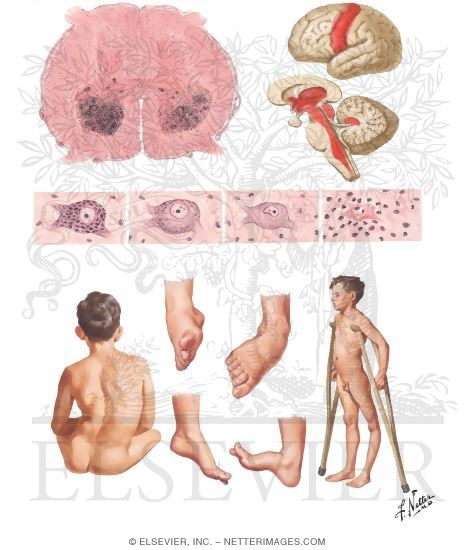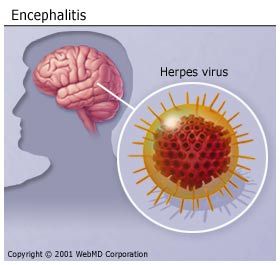Poliomyelitis
Poliomyelitis is a viral disease that can affect nerves and can lead to partial or full paralysis.

Causes.
Poliomyelitis is a disease caused by infection with the poliovirus. The virus spreads by:
- Direct person-to-person contact
- Contact with infected mucus or phlegm from the nose or mouth
- Contact with infected feces
The virus enters through the mouth and nose, multiplies in the throat and intestinal tract, and then is absorbed and spread through the blood and lymph system. The time from being infected with the virus to developing symptoms of disease (incubation) ranges from 5 - 35 days (average 7 - 14 days).
Risks include:
- Lack of immunization against polio
- Travel to an area that has experienced a polio outbreak
In areas where there is an outbreak, those most likely to get the disease include children, pregnant women, and the elderly. The disease is more common in the summer and fall.
Between 1840 and the 1950s, polio was a worldwide epidemic. Since the development of polio vaccines, the incidence of the disease has been greatly reduced. Polio has been wiped out in a number of countries. There have been very few cases of polio in the Western hemisphere since the late 1970s. Children in the United States are now routinely vaccinated against the disease.
Outbreaks still occur in the developed world, usually in groups of people who have not been vaccinated. Polio often occurs after someone travels to a region where the disease is common. As a result of a massive, global vaccination campaign over the past 20 years, polio exists only in a few countries in Africa and Asia.
Treatment.
The goal of treatment is to control symptoms while the infection runs its course.
People with severe cases may need lifesaving measures, especially breathing help.
Symptoms are treated based on their severity. Treatment may include:
- Antibiotics for urinary tract infections
- Medications (such as bethanechol) for urinary retention
- Moist heat (heating pads, warm towels) to reduce muscle pain and spasms
- Painkillers to reduce headache, muscle pain, and spasms (narcotics are not usually given because they increase the risk of breathing trouble)
- Physical therapy, braces or corrective shoes, or orthopedic surgery to help recover muscle strength and function
Prevention.
Polio immunization (vaccine) effectively prevents poliomyelitis in most people (immunization is over 90% effective).
Meningitis.

Meningitis is an inflammation of the membranes (meninges) surrounding your brain and spinal cord, usually due to the spread of an infection. The swelling associated with meningitis often triggers the "hallmark" signs and symptoms of this condition, including headache, fever and a stiff neck in anyone over the age of 2.
Most cases of meningitis are caused by a viral infection, but bacterial and fungal infections also can lead to meningitis. Depending on the cause of the infection, meningitis can resolve on its own in a couple of weeks — or it can be a life-threatening emergency.
If you suspect that you or someone in your family has meningitis, seek medical care right away. Early treatment can prevent serious complications.
Symptoms
It's easy to mistake the early signs and symptoms of meningitis for the flu (influenza). Meningitis signs and symptoms may develop over several hours or over one or two days and, in anyone over the age of 2, typically include:
- High fever
- Severe headache that isn't easily confused with other types of headache
- Stiff neck
- Vomiting or nausea with headache
- Confusion or difficulty concentrating — in the very young, this may appear as inability to maintain eye contact
- Seizures
- Sleepiness or difficulty waking up
- Sensitivity to light
- Lack of interest in drinking and eating
- Skin rash in some cases, such as in viral or meningococcal meningitis
Signs in newborns
Newborns and infants may not have the classic signs and symptoms of headache and stiff neck. Instead, signs of meningitis in this age group may include:
- High fever
- Constant crying
- Excessive sleepiness or irritability
- Inactivity or sluggishness
- Poor feeding
- A bulge in the soft spot on top of a baby's head (fontanel)
- Stiffness in a baby's body and neck
- Seizures
Infants with meningitis may be difficult to comfort, and may even cry harder when picked up.
Causes.
Meningitis usually results from a viral infection, but the cause may also be a bacterial infection. Less commonly, a fungal infection may cause meningitis. Because bacterial infections are the most serious and can be life-threatening, identifying the source of the infection is an important part of developing a treatment plan.
Bacterial meningitis
Acute bacterial meningitis usually occurs when bacteria enter the bloodstream and migrate to the brain and spinal cord. But it can also occur when bacteria directly invade the meninges, as a result of an ear or sinus infection or a skull fracture.
A number of strains of bacteria can cause acute bacterial meningitis. The most common include:
- Streptococcus pneumoniae (pneumococcus). This bacterium is the most common cause of bacterial meningitis in infants, young children and adults in the United States. It more commonly causes pneumonia or ear or sinus infections.
- Neisseria meningitidis (meningococcus). This bacterium is another leading cause of bacterial meningitis. Meningococcal meningitis commonly occurs when bacteria from an upper respiratory infection enter your bloodstream. This infection is highly contagious. It affects mainly teenagers and young adults, and may cause local epidemics in college dormitories, boarding schools and military bases.
- Haemophilus influenzae (haemophilus). Before the 1990s, Haemophilus influenzae type b (Hib) bacterium was the leading cause of bacterial meningitis in children. But new Hib vaccines — available as part of the routine childhood immunization schedule in the United States — have greatly reduced the number of cases of this type of meningitis. When it occurs, it tends to follow an upper respiratory infection, ear infection (otitis media) or sinusitis.
- Listeria monocytogenes (listeria). These bacteria can be found almost anywhere — in soil, in dust and in foods that have become contaminated. Contaminated foods have included soft cheeses, hot dogs and luncheon meats. Many wild and domestic animals also carry the bacteria. Fortunately, most healthy people exposed to listeria don't become ill, although pregnant women, newborns and older adults tend to be more susceptible. Listeria can cross the placental barrier, and infections in late pregnancy may cause a baby to be stillborn or die shortly after birth. People with weakened immune systems, due to disease or medication effect, are most vulnerable.
Viral meningitis
Each year, viruses cause a greater number of cases of meningitis than do bacteria. Viral meningitis is usually mild and often clears on its own within two weeks. A group of viruses known as enteroviruses are responsible for about 30 percent of viral meningitis cases in the United States. As many viral meningitis episodes never have a specific virus identified as the cause.
The most common signs and symptoms of enteroviral infections are rash, sore throat, diarrhea, joint aches and headache. These viruses tend to circulate in late summer and early fall. Viruses such as herpes simplex virus, La Crosse virus, West Nile virus and others also can cause viral meningitis.
Chronic meningitis
Chronic forms of meningitis occur when slow-growing organisms invade the membranes and fluid surrounding your brain. Although acute meningitis strikes suddenly, chronic meningitis develops over two weeks or more. Nevertheless, the signs and symptoms of chronic meningitis — headaches, fever, vomiting and mental cloudiness — are similar to those of acute meningitis. This type of meningitis is rare.
Fungal meningitis
Fungal meningitis is relatively uncommon and causes chronic meningitis. Occasionally it can mimic acute bacterial meningitis. Cryptococcal meningitis is a common fungal form of the disease that affects people with immune deficiencies, such as AIDS. It's life-threatening if not treated with an antifungal medication.
Treatments and drugs.
The treatment depends on the type of meningitis you or your child has.
Bacterial meningitis
Acute bacterial meningitis requires prompt treatment with intravenous antibiotics and, more recently, cortisonelike medications, to ensure recovery and reduce the risk of complications. The antibiotic or combination of antibiotics that your doctor may choose depends on the type of bacteria causing the infection. Your doctor may recommend a broad-spectrum antibiotic until he or she can determine the exact cause of the meningitis.
If you or your child has bacterial meningitis, your doctor may also recommend treatments for:
- Brain swelling
- Shock
- Convulsions
- Dehydration
Infected sinuses or mastoids — the bones behind the outer ear that connect to the middle ear — may need to be drained. Infected fluid that has accumulated between the skull and the membranes that surround the brain also may need to be drained surgically.
Viral meningitis
Antibiotics can't cure viral meningitis, and most cases improve on their own in a week or two without therapy. Treatment of mild cases of viral meningitis usually includes:
- Bed rest
- Plenty of fluids
- Over-the-counter pain medications to help reduce fever and relieve body aches
If the cause of your meningitis is a herpes virus, there's an antiviral medication available.
Encephalitis
Encephalitis (en-sef-uh-LI-tis) is inflammation of the brain. Viral infections are the most common cause of the condition.
Encephalitis can cause flu-like symptoms, such as a fever or severe headache, as well as confused thinking, seizures, or problems with senses or movement. Many cases of encephalitis may go unnoticed because they result in only mild flu-like symptoms or even no symptoms. Severe cases of encephalitis, while relatively rare, can be life-threatening.
Because the course of any single case of encephalitis is relatively unpredictable, it's important to get a timely diagnosis and treatment.


Irrespective of receiving daily oral or future injectable depot therapies, these require health care visits for medication and monitoring of safety and response. If patients are treated early enough, before a lot of immune system damage has occurred, life expectancy is close to normal, as long as they remain on successful treatment. However, when patients stop therapy, virus rebounds to high levels in most patients, sometimes associated with severe illness because i have gone through this and even an increased risk of death. The aim of “cure”is ongoing but i still do believe my government made millions of ARV drugs instead of finding a cure. for ongoing therapy and monitoring. ARV alone cannot cure HIV as among the cells that are infected are very long-living CD4 memory cells and possibly other cells that act as long-term reservoirs. HIV can hide in these cells without being detected by the body’s immune system. Therefore even when ART completely blocks subsequent rounds of infection of cells, reservoirs that have been infected before therapy initiation persist and from these reservoirs HIV rebounds if therapy is stopped. “Cure” could either mean an eradication cure, which means to completely rid the body of reservoir virus or a functional HIV cure, where HIV may remain in reservoir cells but rebound to high levels is prevented after therapy interruption.Dr Itua Herbal Medicine makes me believes there is a hope for people suffering from,Parkinson's disease,Schizophrenia,Cancer,Scoliosis,Fibromyalgia,Fluoroquinolone Toxicity
ResponderEliminarSyndrome Fibrodysplasia Ossificans Progressiva.Fatal Familial Insomnia Factor V Leiden Mutation ,Epilepsy Dupuytren's disease,Desmoplastic small-round-cell tumor Diabetes ,Coeliac disease,Creutzfeldt–Jakob disease,Cerebral Amyloid Angiopathy, Ataxia,Arthritis,Amyotrophic Lateral Sclerosis,Alzheimer's disease,Adrenocortical carcinoma.Asthma,Allergic diseases.Hiv_ Aids,Herpe ,Copd,Diabetes,Hepatitis,I read about him online how he cure Tasha and Tara so i contacted him on drituaherbalcenter@gmail.com even talked on whatsapps +2348149277967 believe me it was easy i drank his herbal medicine for two weeks and i was cured just like that isn't Dr Itua a wonder man? Yes he is! I thank him so much so i will advise if you are suffering from one of those diseases Pls do contact him he's a nice man.